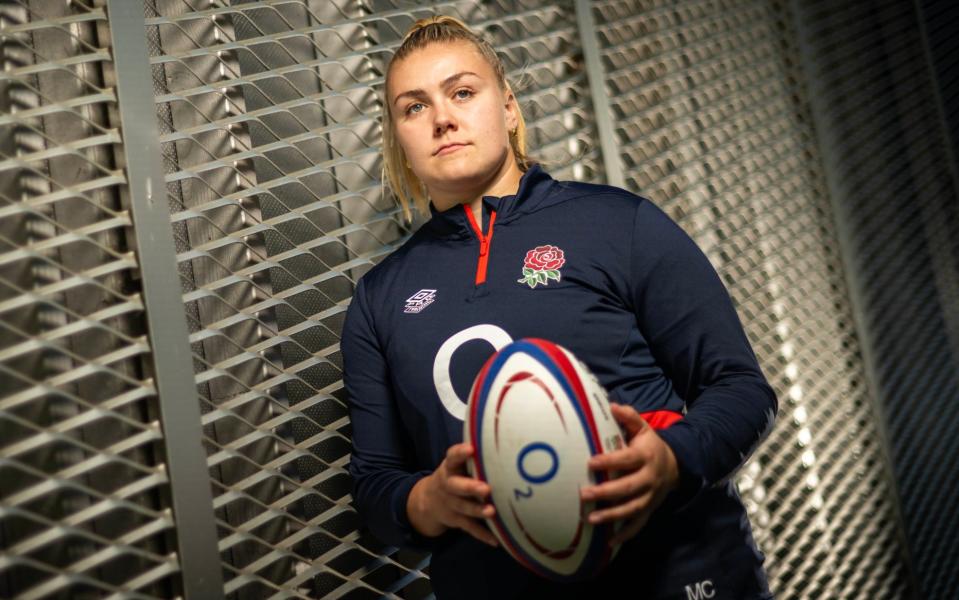Mackenzie Carson: The first player to represent England under rugby’s new eligibility rule

Mackenzie Carson received a phone call this year that changed the course of her rugby career. The Women’s Six Nations had rolled around and England were sorely lacking in the prop department, so the then Saracens front row was parachuted into the squad.
“The timing of it was lucky, all of a sudden, there was a bit of a prop crisis and from there it was pretty full-on,” Canada-born Carson says, reflecting on a whirlwind year. “I feel about 60 at this point. I’m ageing in dog years.”
Carson’s rise has been unconventional. Five years ago, she stepped on to the pitch at Doncaster’s Castle Park stadium to make her debut for Canada, against England, and went on to earn a further two caps before opportunities dried up.
Qualifying through her mother, she would later become the first player to represent England – men or women – under World Rugby’s birthright transfer rule, which allows players to switch countries if they have spent at least three years away from international rugby.
Yet Carson’s career came close to veering off in a completely different direction just months before England came knocking.
Ahead of the World Cup last year, she received another unexpected call, this time from the Canada forwards coach. Injury had struck in the camp and she was asked if she wanted to pull on a red shirt again for the tournament in New Zealand.
Canada return ‘was not right for me’
“I declined,” Carson, who grew up in Abbotsford, a city in British Columbia on Canada’s west coast, says. “Not because I didn’t want to go to a World Cup, but because if I want to go to a World Cup, I want to be part of the training group. If someone says to you, ‘Do you want to go to a World Cup this week?’, it’s a pretty hard thing to say no to. But I didn’t think it was the right time for me in my life at that point.”
Her heart was already set on earning a full-time contract, an ambition she had harboured since moving to England in 2019. After a flurry of eye-catching performances during the Six Nations, her dream became a reality.
Carson can now call herself a full-time athlete, having been awarded one of the upgraded contracts offered by the Rugby Football Union over the summer. In a measure of the growing value within the women’s game, she is earning more as a full-time rugby player than in her previous day job as a charity worker for an organisation that aims to improve the lives of adults through physical activity.
“When I got the phone call from Charlie [Hayter, the RFU head of women’s performance rugby], I was like, ‘It’s happening!’ I never expected him to say, ‘Do you want to do this as a full-time job?’ It’s a pretty special opportunity. There’s a lot of people who’d die for this.”
Canada will always be part of her identity. “I miss the lifestyle. I miss Tim Hortons – it’s like the Canadian version of Starbucks and a staple in Canadian culture,” she says, wistfully.

Yet she is excited about embarking on a new chapter this season at Gloucester-Hartpury, where she will continue to hone her craft as a loosehead prop, having completed her transition from hooker in January.
When not focusing on rugby, she has been busy steaming wallpaper off the walls of the house of Sarah Beckett, the Gloucester and England team-mate she has moved in with. “I’m absolutely rubbish with DIY, but I’m willing to learn.”
This week, her international career will come full circle after being selected to face Canada in the first of two friendlies before England travel to New Zealand to compete in WXV, the global competition that will launch next month.
In an event designed to expose more nations to Test rugby, the Red Roses will have a rematch against New Zealand in Auckland on November 4, less than a year after enduring World Cup final heartbreak against them at Eden Park.
‘They’re doing the same job, with half the resources’
As one of the newer members of the Red Roses squad, Carson does not carry the psychological scars from that match, having watched it while on a trip back to Canada to visit family. “It’s not something that we necessarily dwell on, but it’s definitely a huge motivation for a lot of girls,” she says. “I feel the weight of it, I guess. We all play rugby because we enjoy winning in a team environment.”
So, how will she feel lining up against some of her former peers? Canada’s heroic semi-final showdown against England at last year’s tournament belied their status as a semi-professional set-up. “I have the utmost respect for them,” Carson says. “If there’s a team out there that faces adversity, it’s the Canadian girls.
“They’re doing the exact same job that we’re doing, with half the amount of resources and half the support. To continue to do that, grow the game in Canada and be those role models is really difficult, and then go to your day job every day. It’s a very different structure. They go months without having contact together.”
Carson’s career might have followed a different route, but the chance to line up against familiar faces is an opportunity she is relishing.

